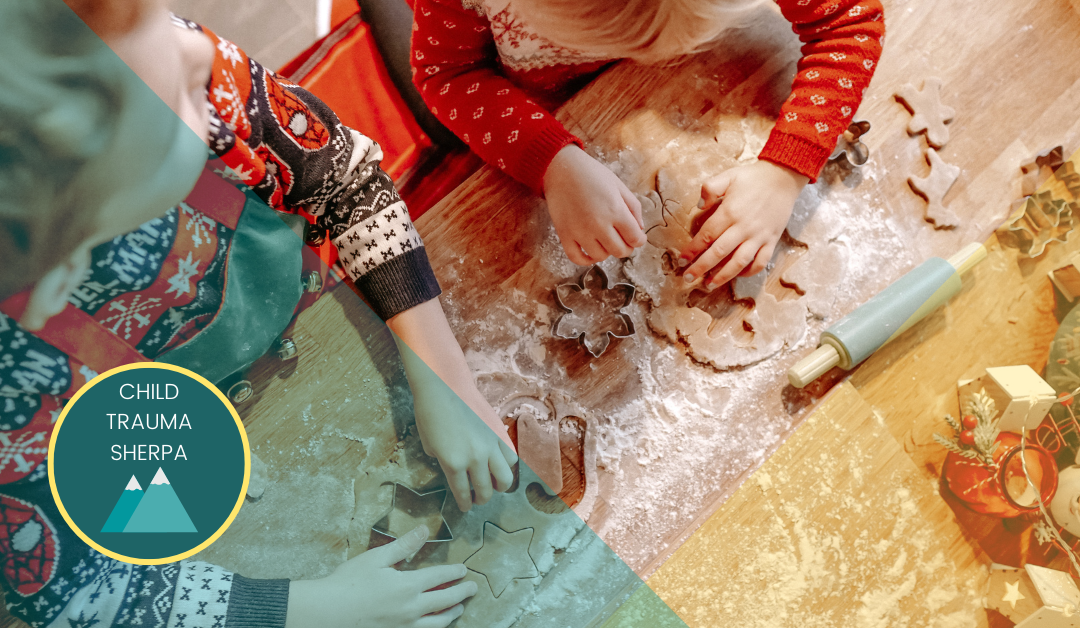Tips to Make the Holiday Season Less Stressful and More Enjoyable for Your Whole Family
The holiday season can be a very special time for families to enjoy celebration and togetherness. But for those parenting a child who has experienced trauma, the holiday season can actually be quite stressful to navigate.
Why the Holiday Season Can be Difficult for Children with Trauma
Many factors can contribute to the added stress and anxiety children with trauma experience around the holiday season. Part of this is the anticipation and hype surrounding experiences in school and the community. Other factors include changes to regular routines, extra stimulation, and changes in diet.
As a parent of a child with trauma, you have come to live by routine because you know that it can have a calming effect for your child. Our brains know what to expect when we have a routine and that relaxes us and lowers our guard. But when you throw holiday parties into the mix, that can disrupt well-established routines, causing your child with trauma stress and anxiety. They can even begin to feel unsafe in an unknown situation.
Changes can also lead to sensory overload. When we don’t know what to expect, we go into fight or flight mode, and absorb all of the stimuli around us to help us determine what action we should take. This can lead to sensory overload. With holiday music, TV specials, gift shopping, parties, changes in bedtime, loads of sugary food, and more, it’s no wonder that all of us can get overwhelmed! But for children with trauma, this overload can trigger challenging and regressive behaviors.
However, it is just as important to find ways to build and enjoy holiday traditions with your adopted child with trauma. Traditions can help your child feel safe and anchored to the larger family. It can also be a way to transmit values that you hold dear.
Tips to Enjoy the Holidays with Your Adopted Child with Trauma
Here are some ways you can make the holiday season more enjoyable for the whole family, including your child with trauma.
- Learn about your adopted child’s holiday and cultural traditions and incorporate those things into your entire family’s holiday experience.
- Be mindful of your child’s changing perspective on the holidays and feelings of loss or previous history with the holiday season.
- Don’t take their “poor” behavior personally–it’s about shifting your mindset!
- When your child is struggling, take time to understand the real reason behind their feelings. Build trust by acknowledging and validating their feelings, then talk to them about healthier ways to respond to what is triggering them.
- Maintain basic routines as much as possible to provide stability. When there are changes you know about ahead of time, such as a holiday party, prepare your child for the change in routine and give them plenty of notice.
- Anticipation can be triggering for a child with trauma so ease that anxiety by talking through the emotions that surprise can evoke, then make a plan together to set healthy expectations.
- Don’t overwhelm your child with too many gifts and don’t overlook the power of connection-building experiences you can have with your child that can be more purposeful than toys or other items.
- Set boundaries that protect your child, especially with extended family who may not understand. You are the gatekeeper, so advocate for your child and leave stressful situations when necessary.
- Don’t forget to take care of yourself during the holiday season. Your child will sense when you are stressed and that can stress them out further. Remember, you can help your child regulate better when you are well rested and regulated yourself!
Key Takeaways and Final Thoughts
The holidays can be stressful for everyone. To help your child regulate during this time of year, focus on sticking to a routine as much as possible and planning for changes ahead of time when you can. When your child does act out, validate their feelings and then help them find a better way to deal with what is upsetting them. Finally, while your child is in charge of their own healing, you are there to protect them while they work through their trauma. Don’t be afraid to step on family members’ toes by leaving a family party if your child is triggered or overwhelmed. Your first priority should always be your child with trauma, but don’t forget to take care of yourself so you can be there for your child!


